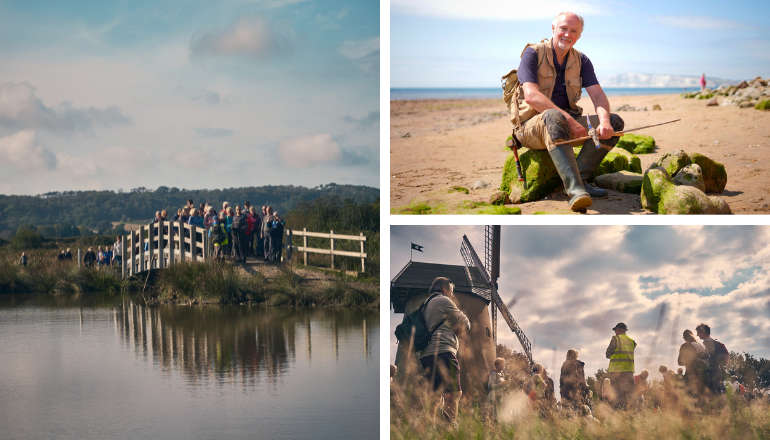
Sara Whatley spoke to Melanie Hodson, Head of Information Support at Hospice UK about how to talk openly and honestly about death and dying
It is a well-known phrase that goes there are two certainties in life: death and taxes. Neither can be avoided and at some point in all of our lives, both of them will affect us.
Yet there is a way we can make this easier (not the taxes, sorry) – for death, certainly, is not always an easy subject to talk about. Over the last few years there has been increasing awareness of the importance of talking about death, dying and funeral planning in an open and honest way. The hope is to try to break down some of the barriers and stigma attached to the topic. After all, it happens to us all, so better to be prepared and supported in it rather than alone and unsure.
There are many things to think about within this huge topic, and needless to say every experience is individual. Some things might work for you, and others will not. That is fine. What is important to remember is to do what you are comfortable with and what will help you, and your loved ones.
With this in mind we set out to have an open conversation with an expert on the subject. Melanie Hodson, Head of Information Support from charity Hospice UK, kindly shared the following words with us:
The importance of talking about death and grief
“Throughout our lives we make choices about the way we live, and we make these choices based on what matters most to us. Planning for the end of our lives is no different.
Emotionally, planning for death can help people live well until the end, help prepare for grief and help people feel less alone or confused about what to expect. On a practical level, it’s important to think about wills, funeral plans and the type of end-of-life care you or a loved one would like.
Having these conversations can make a big difference in the long term. People can feel vulnerable when a loved one dies and it can be hard to make the right decisions about things like funerals. If the person who died has talked about what matters to them, it makes it easier for those who are grieving to follow the wishes of the person they care about – and there’s some comfort to be found in doing that.”
Talking about dying...
“There’s no perfect way to talk about dying, but there are things you can do to make it easier.
The way we respond when people bring up the subject can make a big difference. It’s all about listening – with no judgement. If we struggle to talk about death, it can make it harder to support a grieving friend or answer questions from loved ones.
But if we’re ready to listen, it makes it a lot easier to discuss things like wills, funeral plans, how and where we want to be cared for, and worries about the future. You don’t need to try and be an expert – the main thing is to let the conversation flow, rather than brushing it off or looking uncomfortable.
Talking about death won’t bring it closer, and lots of families say that it’s a relief to have the conversation and get things into the open. These conversations can help to make the future easier for everyone.”

…Family and friends
-Choose a good moment to talk when you have time and space
- Be reassuring and honest
- Acknowledge that talking about these things may not feel comfortable
- Use conversation starters such as “We’ve never talked about this before but...”
- Don’t be afraid of laughter, tears or silences in the conversation
- Take things one step at a time, you don’t need to cover it all in one go
- Don’t worry about saying the wrong thing
- Look after yourself after the conversation
…Children
-Have an open conversation
- Listen carefully and try to let children lead the conversation
- Let children know that death is a part of life, and maybe use some examples from nature
- Try not to look uncomfortable
- regular, short conversations about death might help more than one long one
- Be clear and direct in your language; phrases like ‘passed away’ can be more confusing than helpful
- Check they’ve understood what you mean
- Don’t be afraid to get emotional; grief is normal and nothing to be ashamed of

How to approach talking about death for people living with dementia
“Dementia affects people in lots of different ways, but it often causes memory loss and confusion, and it can make it hard for people to carry out everyday activities. Dementia can be a difficult condition for family and friends to cope with too, as they see changes in people they love.
By putting plans in place for end of life care, you can help a loved one with dementia to live more comfortably in their final days.
Having conversations about the end of life as early as possible can be helpful. It reduces anxiety, because everyone knows what to expect. It means you can agree who will take decisions if your loved one is no longer able to. And it makes sure everything is taken care of, reducing stress and hidden costs later on. By talking about dying now, you can bring everyone peace of mind in the future.
Remember that talking about it won’t bring death closer, but it will give you more time to get everything sorted. Things like organising lasting power of attorney and writing wills can take time. Later on, events like anniversaries and birthdays can be a helpful reminder to make sure everything is organised and up to date.
Things to talk about might include living arrangements if your loved one needs more help over time. And looking to the future, are there types of support that your loved one does or doesn’t want?”

Thinking about what to leave for others
“In planning ahead, you might like to think about things to leave for your loved ones to remember you by and bring comfort in recalling how important they were to you.
Some people like to create memory boxes containing meaningful items and keepsakes so that they can pass on treasured memories and commemorate important events. Memory boxes might include greeting cards for future birthdays, photographs, family recipes, letters or audio files with messages. Creating memory boxes can be an emotional experience, so you may like to ask a family member or friend for help.
Handwritten letters can capture the uniqueness of you and cards with special messages provide treasured keepsakes. If you are creative, you may like to make a quilt with fabrics that hold personal meaning or create a montage of photographs with special memories.”

Planning your own funeral
“It’s one of life’s biggest events, if not the biggest. It’s the only one we can’t avoid, yet many of us either avoid talking about it until it’s too late, or don’t think about our own funerals until we're coming to the end of our lives.
Making plans for your funeral now will help your friends and family. At a time of great distress and upset, they will be able to make important decisions about celebrating your life in meaningful ways. You could think of it as your last act of kindness.
When it comes to planning your own funeral, there are more choices than you might realise.
You can leave written wishes about the type of funeral you want and what should happen to your body in your will, or in a separate note to give to someone you trust. This can include readings, music and hymns for example, as well as who you would like to be there. Start with what matters to you
A funeral director can also help you to think about your options. They can provide free advice about planning your own funeral and ways of paying for it.”


 Five Fantastic Destinations To Visit in May
Five Fantastic Destinations To Visit in May
 Five Of The Most Unique Ice Cream Flavours Worldwide
Five Of The Most Unique Ice Cream Flavours Worldwide
 Five Incredible Curries From Around The World
Five Incredible Curries From Around The World
 Five Brilliant Twists In Mind-Bending TV Shows
Five Brilliant Twists In Mind-Bending TV Shows
 Our Five Favourite Twists In Cinema
Our Five Favourite Twists In Cinema



 Three Men Arrested On Suspicion Of 'Attempting To Take Child'
Three Men Arrested On Suspicion Of 'Attempting To Take Child'
 Wildheart Animal Sanctuary Rescue To Bring First Bears To Isle Of Wight For 30 Years
Wildheart Animal Sanctuary Rescue To Bring First Bears To Isle Of Wight For 30 Years
 One Week To Go Until Isle Of Wight Walking Festival 25th Anniversary
One Week To Go Until Isle Of Wight Walking Festival 25th Anniversary
 Apply Now For Grant Funding To Help Strengthen Family Support On Isle Of Wight
Apply Now For Grant Funding To Help Strengthen Family Support On Isle Of Wight
Comments
Add a comment